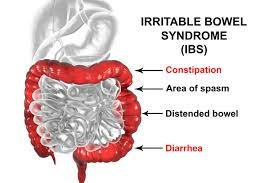



IRRITABLE BOWEL SYNDROME
• Irritable bowel syndrome (IBS) is a benign, chronic symptom complex of altered bowel habits and abdominal pain.
Aetiology
• No organic cause can be found.
• Altered GI motility occurs in the form of exaggerated gastrocolic reflex, altered gastric emptying, increased small bowel contractions and increased small intestinal transit.
• Neurotransmitters such as serotonin may be an important factor.
• Psychological disturbances like anxiety, tension and excessive worry are all aetiologically significant.
• Certain foods may precipitate an attack.
Clinical Features
• Three clinical variants:
• Those with spastic colitis, having primarily chronic abdominal pain and constipation (IBS with constipation or constipation-predominant IBS-at least 25% of stools are hard and fewer than 25% are loose or watery).
• Those with chronic intermittent, watery diarrhoea often without pain (IBS with diarrhoea or diarrhoea-predominant IBS-at least 25% of stools are loose or watery and fewer than 25% are hard).
• Those with both features and alternating diarrhoea and constipation (mixed IBS-at least 25% of stools are loose or watery and at least 25% are hard).
• More common in females of the age group 20-40 years.
• Abdominal pain is the most common symptom. Pain is referred to left or right iliac fossa or hypogastrium.
• Pain often provoked by food and relieved by defecation.
• Diarrhoea is often painless, occurs in the morning but never at night.
• In constipation-predominant IBS, stools are described as pellet like, ribbon like or pencil like.
• Mucus may or may not be present.
• Postprandial tenesmus is common, due to an exaggerated gastrocolic reflex.
• Other symptoms are abdominal distension, feeling of incomplete evacuation of rectum, excessive flatus, dyspepsia, heart burns, frequency and dysuria.
Investigations
• Prime aim of investigations is to exclude organic bowel diseases.
• Stool examination for leucocytes, parasites, ova, and occults blood
• Routine testing for coeliac disease is advisable
• Sigmoidoscopy
Large amounts of mucus may be seen. Bowel shows marked motor activity
• Barium enema-Usually normal.
• Exclude lactase deficiency, hyperthyroidism and alcohol abuse.
Management
• Reassurance of the patient and explanation for the symptoms.
• Increase the roughage content of the diet and add a bulk laxative
TREATMENT AT DR. SOHAN LAL CLINIC
The integrated POLYCLINIC facility offers patients to select their treatment either from the Department of Homeopathy or from the Department of Medicine.
We provide scientific, research-based, and professional services to people across the world, aiming to achieve the highest success rate.
